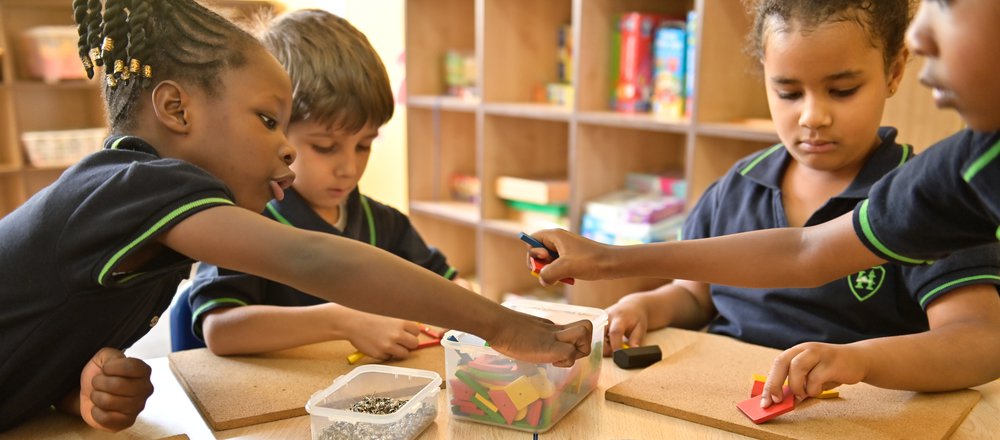Early Years

Welcome to Hillcrest Early Years, where learning is fun!
At Hillcrest Early Years, we provide a rich and stimulating learning environment in a caring and secure setting. Our warm, family-style atmosphere is further enriched by the culturally diverse community we encompass. This brings many wonderful aspects to the classroom, not least strong foundations of appreciation for one another.
Nurturing children’s creative thinking skills through play-based learning builds their self-confidence and encourages them to become inquisitive, independent, and self-motivated learners who love school. The benefits of being an inquisitive, interested person cannot be underestimated, and we encourage a strong sense of curiosity in all our children.
High expectations and standards of learning are embedded in our practice. The Early Years Foundation Stage curriculum is carefully tailored by the teachers to meet the unique needs of each individual child, ensuring all children are appropriately challenged in their learning. Monitoring and assessment are integral parts of our everyday teaching practice, with detailed and comprehensive Learning Journeys developed for every child. These documents track your child’s progress as they move through the Early Years Foundation Stage and onto Key Stage 1, recording and evaluating each developmental step.
Hillcrest Early Years is a happy and healthy environment for children to thrive in, emotionally, physically, and academically. We provide a truly holistic early years approach, from our healthy snacks to the range of fun extra-curricular clubs offered to the endless cuddles given by staff.
We also recognise that you, the parent, are the first and foremost educators in our little children’s lives. We aim to develop strong parent partnerships and welcome you to participate in our vibrant Hillcrest community.
Miranda McGovern
Head of Hillcrest Early Years
Curriculum
Thematic Learning
Hillcrest Early Years (HEY) teachers use thematic units to engage children in the learning process with a variety of lessons and projects in subjects ranging from art and music to science and math. A common theme keeps student learning focused on a broad concept while touching on specific knowledge and skills throughout.
It’s Cross-Curricular
Theme units allow us to delve into one particular subject in all curricular areas. When the same theme occurs across the curriculum, the children are able to revisit the same ideas and apply them in different ways, resulting in a richer understanding of the subject.
It’s Motivational
Integrated theme units are motivational for both teachers and students. Engaging themes that relate to our young children’s lives help them get excited about learning. An Early Years student who loves animals but doesn’t necessarily love math might get excited about adding and subtracting when it’s tied to an animal theme, for example.
It Builds on Prior knowledge
Our HEY themes often play off of what children already know, such as animals and well-known stories. Having prior knowledge gives young children confidence and opens them up to learning new information. When the same concepts keep popping up, children can continue to build on prior knowledge with each new lesson.
Classes
Our youngest learners in Early Years enjoy a play-based environment at the start of their learning journey. Here the children develop their growing confidence in the world around them and start to learn those all important social skills by interacting with their friends. They have their own space in our Early Years unit, and our staff provides activities that stimulate and develop their learning. Their time in our playgroup helps them prepare for their journey through Hillcrest Early Years. Our staff members are experienced and understand the importance of providing carefully planned activities for the youngest children.
Teachers in this class understand the unique needs of this age group, ranging from potty training to napping, and are always on hand for a cuddle!
Nursery (2–3 years)
Our young children enjoy a play-based curriculum where they are encouraged to develop confidence, build trust, and continue to familiarise themselves with the school environment. These play opportunities are carefully designed to build their independence and nurture curiosity and a love of learning.
Our planned indoor and outdoor play spaces are designed to stimulate your child’s natural inquisitiveness and creativity, as well as collaboration with other children.
Foundation Stage 1 (3–4 years)
Interesting topics are explored by teachers and children to develop general knowledge and allow children to create links in their learning. Each child is challenged according to his or her abilities through activities specifically designed to suit their own personal abilities, learning style, and developmental stage.
In FS1, the ‘Letters and Sounds’ phase 1 programme is initiated, which introduces your child to phonics through fun games and sound awareness activities. This builds a strong foundation for literacy.
Foundation Stage 2 (4–5 years)
Lots of exciting leaps are made in the final year of the Early Years Foundation Stage. A careful balance of play-based learning and teacher-led activities provides a fun and varied curriculum that encourages children to be self-motivated in their learning.
Children continue with the ‘Letters and Sounds’ programme (phases 2, 3, and 4) as they develop their early reading and writing skills. Exciting learning adventures are explored through topics, taking the children to faraway places, developing scientific and geographical knowledge, and inspiring a sense of wonder and curiosity.





